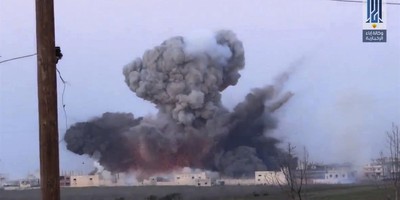Nothing so well illustrates the essential asymmetry of this country's worldwide struggle against terrorism than last week's 5-to-4 opinion out of the U.S. Supreme Court. The enemy is fighting a war; we are litigating a plea.
Throughout the sleepy Nineties, we dealt with two - two! - earlier and incomplete attacks on the World Trade Center not as the barbaric acts of war they were, but as isolated matters for the criminal justice system to deal with when and if it could. While we slept, the enemy plotted. We paid the bloody price for our obtuseness - in thousands of innocent lives - on September 11, 2001.
Now we're proceeding with great deliberation down the same blind alley.How describe this latest opinion from the high court? It's not easy to get a handle on this decision for, against or maybe just vaguely about the exercise (or paralysis) of the president's wartime powers. Here is how His Honor Anthony M. Kennedy - heir to the equally vacuous Sandra Day O'Connor's swing vote on the high court - "explained" what his majority opinion means, or rather doesn't mean:
"Our opinion does not undermine the Executive's powers as Commander in Chief. On the contrary, the exercise of those powers is vindicated, not eroded, when confirmed by the Judicial Branch."
But doesn't this majority opinion de-commission or at least disable the system of military courts that the chief executive put in place, and Congress repeatedly reformed in order to meet the court's earlier objections?
Like the rest of Mr. Justice Kennedy's majority opinion, the answer to that question isn't clear. In the way of those who, when asked for a little simple clarity, do little but repeat their original non-sequiturs only in a louder voice, Justice Kennedy declaims: "It bears repeating that our opinion does not address the content of the law that governs petitioners' detention. That is a matter yet to be determined."
Recommended
But when? For this is the third time in four years - or is it the fourth time in three years, and does it matter? - that the high court has left the question of how or if to try enemy combatants up in the cloudy air. What are the other branches of government, or even the lower courts, let alone our troops in the field, now to do with these detainees and future ones? The weightless burden of the court's confused and confusing guidance on this subject might be summed up as: To Be Determined.
Each time the Supreme Court has ruled against this system of trying enemy combatants, lawful or unlawful, Congress and the executive - at the court's explicit behest - have moved to meet its objections, only to be told once again that the tribunals still don't pass constitutional muster.
Associate Justice Antonin Scalia, who is nothing if not plain-spoken, was his usual clear and precise self on this occasion, even if he does have a well-known tendency to call a spade not just a spade but a damned shovel:
"The game of bait-and-switch that today's opinion plays upon the Nation's Commander in Chief will make the war harder on us. It will almost certainly cause more Americans to be killed."
And not just Americans, if Mr. Justice Scalia proves as prescient as he is plain. Already prisoners at Guantanamo who have had to be released have returned to attacking American troops and/or civilian targets, and had to be recaptured. Having again entered the maw of the American judicial system, who knows if they will ever face justice? That question, too, remains Yet To Be Determined.
If and when these military tribunals are reconstituted still again, the high court can declare their standards unconstitutional still again. Till these detainees - including the confessed mastermind of the 9/11 attacks, who should have been swinging from the end of a stout rope long ago - die peacefully of old age. At that point, having voted to delay justice indefinitely, the U.S. Supreme Court can again complain that the process it has repeatedly prolonged is taking entirely too long.
Once upon another time, namely Franklin Roosevelt's, most of a group of German saboteurs that had infiltrated this country were caught, tried by a military tribunal that was convened by executive order for that purpose, promptly convicted and then executed - all within seven weeks. Can anyone imagine that kind of swift and effective justice from this court?
Of course, that war was different. America was determined to win it. At this point, to judge by last week's majority opinion, it's not clear whether the Supreme Court realizes we're in one.
The one thing that this latest example of law at its least vigilant does make clear is the importance of this year's presidential election. John McCain, who knows something about war and being a prisoner thereof, says he would appoint judges who are committed to judicial restraint; he's criticized this decision. Barack Obama has praised it. However confused and confusing this latest decision out of the high court, it does clarify the decision facing the American voter this November.
Something else became clearer to me on wading through the court's muddy majority opinion: If Abraham Lincoln had had a Supreme Court like this to deal with, and he pretty much did, and had that president and commander-in-chief failed to outmaneuver that court's pro-slavery chief justice, the Hon. Roger B. Taney, he of the infamous Dred Scott decision, then I might well be writing this column from Little Rock, Ark., C.S.A.

























Join the conversation as a VIP Member